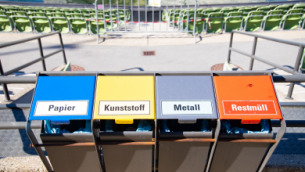Quiz 2A: Conjugate the Verb werden
Conjugate the verb werden for each subject. The English translations are below the exercise.- Gisela die Nachrichten lesen.
Gisela will read the news. - Johann Kaffee trinken.
Johann will drink coffee. - Und du? Du Tee trinken.
And you? You will drink tea. - Und Sie? Sie auch Tee trinken.
And you (formal)? You will also drink tea. - Ihr Fahrrad fahren.
You all will ride bikes. - Und wir schwimmen.
And we will swim. - Ich die Nachrichten lesen.
I'm going to read the news. - Das Wetter kalt.
The weather is getting cold. - Gisela und Johann viele Nachrichten lesen.
Gisela and Johann will read a lot of news.
Quiz 2B: Separable Verbs
Sentences 1-5 require you to fill in the correct verb in the infinitive form. Sentences 6-10 use the same verbs, but you need to conjugate the stem and place the separable prefix at the end.| anfangen - ausgeben - zurücktreten - losgehen - vorschlagen |
- Gisela wird morgen eine neue Arbeit .
Gisela will begin a new job tomorrow. - Es ist spät. Wir müssen jetzt .
It's late. We need to leave now. - Die Kollegin wird etwas Neues .
The colleague (f) will suggest something new. - Der Staat wird zu viel Geld . Das ist nicht gut.
The government is going to spend too much money. That's not good. - Vielleicht wird der Ministerpräsident .
Maybe the Prime Minister will resign. - Heute Gisela eine neue Arbeit .
Today Gisela begins a new job. - Wir jetzt .
We're leaving now. - Die Kollegin etwas Neues .
The colleague (f) suggests something new. - Der Staat zu viel Geld .
The government spends too much money. - Der Ministerpräsident .
The Prime Minister resigns/is resigning.

























